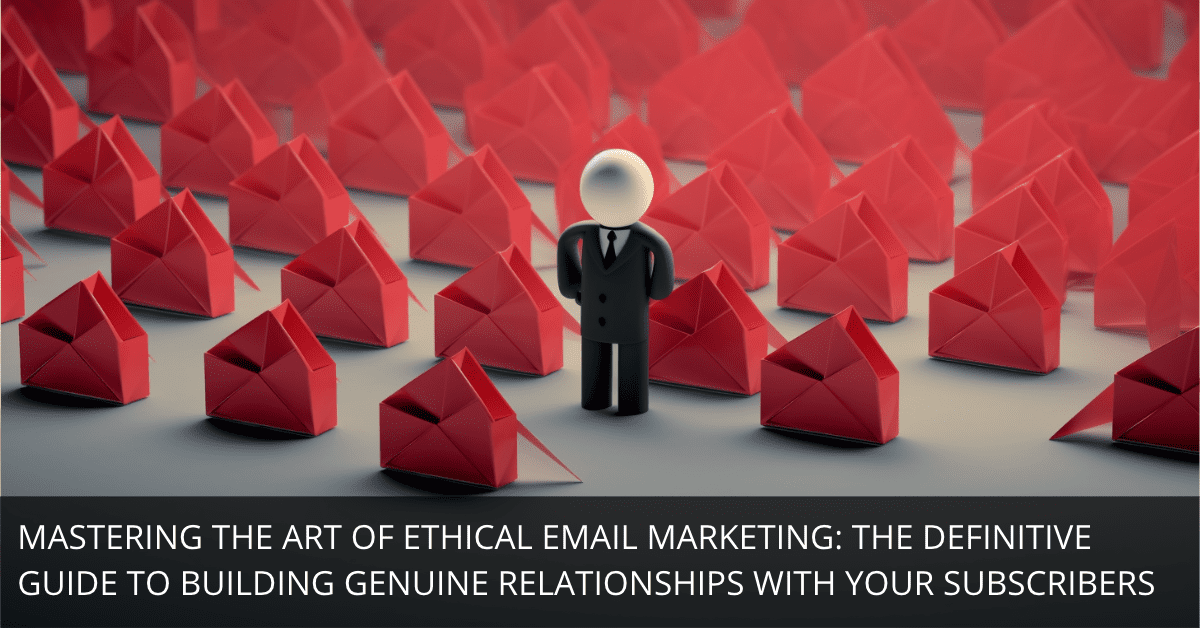
Everyone loves an email.
It's a virtual letter, a cyber hello, a pixelated pat on the back, right?
Well, not always.
In our digital age, you, as an entrepreneur or business owner, need to tread carefully when growing your email list.
Unmasking the Monster: What Is Email Spamming?
Imagine this: your home mailbox is brimming with unsolicited leaflets, flyers, and advertisements.
You didn't ask for them, yet here they are.
That's what email spam feels like; only it's your digital home getting cluttered.
By definition, email spamming is sending unsolicited messages, usually advertising, over email.
It's the digital equivalent of door-to-door salespeople you didn't invite over for coffee.
In most cases, the spam is sent to countless recipients who didn't opt-in to receive these messages.
Paving the Road to Ethical Email Marketing
Remember the tale of the tortoise and the hare?
Slow and steady wins the race.
Well, the hare is spamming, racing to an inbox without an invitation.
The tortoise?
That's ethical email marketing, a slow, consistent, and considerate approach.
Acquiring Permission is Mandatory
Picture this: someone crashing your party without an invite, eating all the hors d'oeuvres, and demanding everyone's attention.
How would you feel? Probably not too happy, right?
Email marketing works the same way. It's a party, and your subscribers are your invited guests.
You don't just barge into their inbox; you ask for their permission first. That's the basic principle of permission-based marketing.
Transparency is The Best Policy
Wouldn't you appreciate it if that party crasher introduced themselves first, told you why they're here, and asked if they could join?
That's precisely what transparency in email marketing is all about.
Your subscribers should know what they're signing up for.
- How often will you send emails?
- What kind of content will they contain?
- These questions shouldn't be mysteries.
Let your audience know what to expect, and they'll respect you for it.
Relevance and Respect for Privacy
You've got permission. You've introduced yourself. Now, you must ensure your party guests are having a good time.
How?
By giving them what they came for. Provide relevant, interesting, and value-added content in your emails.
And remember, respect for privacy is paramount.
Treat subscriber data with the care and respect it deserves. This includes abiding by data protection regulations and maintaining the trust you've built with your subscribers.
Proven Strategies for Ethical Email List Growth
Alright, let's get to the meat and potatoes of this conversation.
How do you grow your email list, tortoise style?
Crafting Valuable Content
Ever heard the phrase "content is king"?
Well, it's true. High-quality, valuable content is the cornerstone of growing your email list.
This includes articles, webinars, how-to guides, podcasts, etc. Think of it as a magnet that attracts people to your brand.
Optimizing Your Website for Subscriptions
Is your website a labyrinth or a welcoming avenue?
Does it nudge visitors towards subscribing, or does it leave them wandering in confusion?
Your website should guide visitors to sign up using strategically placed subscription forms, pop-ups, footers, and sidebars.
Enticing Sign-Ups With Incentives
Who doesn't love a gift, a surprise, a little something extra?
Offering incentives like discounts, free eBooks, or exclusive access to content can be a powerful motivator for potential subscribers.
Harnessing the Power of Social Media Promotion
Here's a thought: your email list is a club, and social media is the loudspeaker that announces it.
Platforms like Facebook, Instagram, Twitter, and LinkedIn can be valuable tools in encouraging sign-ups.
They allow you to reach a wider audience, share your incentives, and showcase the value of joining your club.
Keep Spamming at Bay: Practices to Avoid
If ethical email marketing is the tortoise, spamming is the fox waiting to trip it over.
Here are a few sly foxes you should be wary of:
Purchasing Email Lists
You may have encountered ads or offers selling thousands of emails for a nominal price.
Tempting? Sure.
Ethical? Absolutely not.
Remember, ethical email marketing is about getting an invitation to the party, not barging in uninvited.
Misleading Subject Lines
Ever been tricked into clicking on an email by a misleading subject line?
Not a pleasant experience, right?
Subject lines should be catchy but honest, reflecting the content of your email.
Neglecting Email List Hygiene
Over time, your email list can gather a bit of dust - inactive users, incorrect emails, and unengaged subscribers.
Regularly cleaning up your email list ensures you're reaching out to those who genuinely want to hear from you.
Making Unsubscribing a Challenge
Have you ever tried to exit a store only to be trapped in a maze of aisles and displays?
Frustrating, isn't it?
The same goes for emails. If a subscriber wants to leave, make the exit clear and easy.
The Extra Mile: Double Opt-In Process
What's better than an invite to the party?
A confirmation.
That's the double opt-in process in a nutshell. It's a two-step process where users confirm their email subscription, ensuring they're truly interested and engaged.
Not only does it help avoid accidental sign-ups, but it also helps maintain a clean, engaged email list—a list of people who genuinely want to party with you, metaphorically speaking.
Learning from the Best: Case Studies
How about some real-life examples of ethical email marketing done right? Let's take a peek at a couple:
- Company A: They grew their list by offering a free eBook, optimized their website for easy sign-ups, and maintained a high standard of privacy and relevance in their emails.
- Company B: They leveraged social media to promote their exclusive subscriber content, implemented a double opt-in process, and regularly cleaned their email list.
You see, it's all about providing value, respecting your audience, and growing your list steadily and ethically.
Wrapping It Up: The Ethical Road to Email List Growth
So, we've traveled the road from understanding email spamming to mastering the art of ethical email list growth.
Now, it's up to you.
Will you be the hare or the tortoise?
Remember, in the long run, it's not about the number of subscribers but the quality of your relationship with them.
Grow your list ethically, provide value, and respect your subscribers, and success will follow.
This journey might seem long but remember, slow and steady wins the race.
And in this race, the prize is a robust, engaged email list built on trust, value, and respect.
So, are you ready to take the first step?
Let's get the party started!
Frequently Asked Questions
- Why is it important to grow an email list ethically?
Growing your email list ethically is crucial because it respects your subscribers' privacy, builds trust with your audience, and complies with data protection regulations. It also ensures that your email marketing efforts are effective and yield positive results. - What are the key principles of ethical email marketing?
The key principles of ethical email marketing include permission-based marketing, transparency, relevance, and respect for privacy. These principles help establish a solid and trustworthy relationship with your subscribers. - What strategies can I use to grow my email list ethically?
Some effective strategies for ethical email list growth include creating valuable content, optimizing your website for subscriptions, offering incentives for sign-ups, promoting your email list on social media, and implementing a double opt-in process. - How can I avoid spamming in my email marketing?
You can avoid spamming by never purchasing email lists, avoiding misleading subject lines, regularly updating and cleaning your email list, and offering easy unsubscribe options. Remember, your aim is to provide value to your subscribers, not to invade their inboxes. - What is a double opt-in process, and why should I use it?
A double opt-in process is a two-step subscription process where users confirm their email subscription. This process helps avoid accidental sign-ups and ensures your email list consists of engaged and genuinely interested subscribers. It's an extra step towards ethical email marketing.

